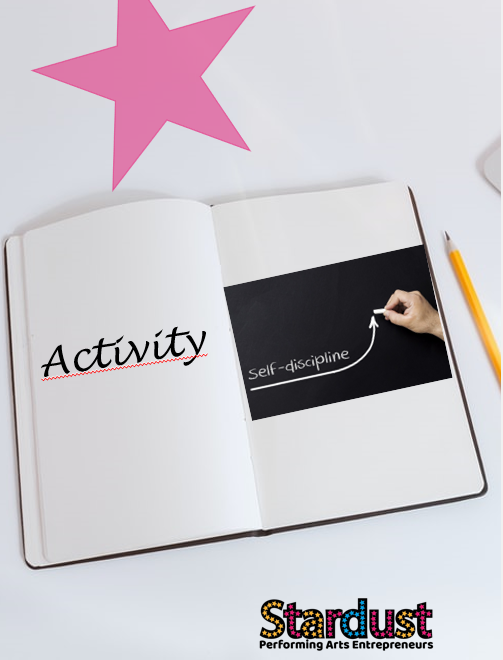
Module 4
"Building self-discipline to excel in work"
"Building self-discipline to excel in work"
Aim
The purpose of this module is to provide musicians with knowledge, skills and attitudinal change to develop a personal commitment to achieve professional goals.
By the end of this module, you should be able to...
Knowledge
- Understand the importance of setting realistic objectives to achieve higher goals.
- Identify barriers and distractions and how to overcome them.
Skills
- Create and maintain positive habits that lead to professional improvement.
- Set realistic progressive plans to optimize willpower.
Attitudes
- Build up resiliency and focus on positive thinking to achieve professional objectives.
Key-concepts
SELF-DISCIPLINE
Self-discipline is the ability to push yourself forward, stay motivated, and take action, regardless of how you’re feeling, physically or emotionally. You are showing it when you intentionally choose to pursue something better for yourself, and you do it despite factors like distractions, hard work, or unfavorable odds.
Self-discipline is different from self-motivation or willpower. Motivation and willpower contribute to it, as do persistence, the ability to follow through on your intentions, and hard work.
Self-discipline is an important trait to develop, no matter what your career is, It’s the key to achieving personal goals and career success.
Self-discipline is the ability to focus on a task or goal with the purpose of achieving a certain result. Much like other qualities that might contribute to your overall success, self-discipline produces sustainable success over time. Self-disciplined individuals commonly rely on a group of supporting traits, such as: ambition, organization, persistence, responsibility, resilience and strong work ethic. Self-discipline promotes the kind of habits and mindset that help you complete tasks, surpass milestones and reach specific goals.
SELF-CONTROL
Self-control is the ability to regulate and alter your responses in order to avoid undesirable behaviors, increase desirable ones, and achieve long-term goals. Research has shown that possessing self-control can be important for health and well-being. People use a variety of terms for self-control, including discipline, determination, grit, willpower, and fortitude.
Psychologists typically define self-control as the ability to control behaviors in order to avoid temptations and to achieve goals.
Researchers have found that people who have better self-control tend to be healthier and happier, both in the short-term and long-term.
MOTIVATION
Motivation is the process that initiates, guides, and maintains goal-oriented behaviors. It is what causes you to act.
Motivation involves the biological, emotional, social, and cognitive forces that activate behavior. In everyday usage, the term “motivation” is frequently used to describe why a person does something. It is the driving force behind human actions.
Motivation doesn’t just refer to the factors that activate behaviors; it also involves the factors that direct and maintain these goal-directed actions.
PERSISTENCE
Persistence is the trait that allows someone to continue doing something or trying to do something even though it is difficult or opposed by other people.
Therefore, persistence is not taking the easy road to a decision or action.
It should go without saying that professional musicians must possess persistence as a key characteristic.
GOALS SETTING
Goals are the first step towards planning for the future and play a fundamental role in the development of skills in various facets of life, from work to relationships and everything in between. They are the target at which we aim our proverbial arrow.
Understanding the importance of goals and the techniques involved in setting achievable goals paves the way for success.
How to overcome the main obstacles to self-discipline?
REFRAINING
Refraining from something pleasurable for a long-term gain is incredibly hard. Find a replacement behavior to help us overcome this sense of deprivation. The alternative habit becomes the distraction and replacement for the behavior you are trying to stop.
OUR BELIEFS
Our limiting beliefs can hold us back from being disciplined and productive. We tell ourselves that we must be in the mood/motivated to do something. Having this belief therefore completely stops us from engaging in the behavior when our perceived conditions are not in place, which are often it`s only naturel to feel this way sometimes. The trick is to see these as ‘desirable’ conditions, not ‘essential’ ones. With this in place, we’re more likely to start something and then our motivation and mood tends to kick in once we get started.
RELAPSE
We must teach ourselves to decline the unhelpful invitations we receive each day that threaten to de-rail us from our goals. We can think for ourselves and refuse to give in to the pressure (from ourselves, friends, and society) to take up unhelpful invitations.
However, if we do give in, it’s worth noting that this is a very normal part of change. When we’re trying to adapt our behavior, it’s very common to slip back into old habits or to not engage in the way we wanted to. That’s fine. We just need to learn what triggered us to come unstuck, plan how to overcome that obstacle next time, dust ourselves off, remind ourselves of what our goals were, why we want to achieve them, and then try again. Remember, it takes time to embed and maintain new habits…you’re worth the effort though!
Methods to avoid mental blocks to self-discipline
1.Challenge your perceptions. Often, it is our perception of limitations that provide the first barrier to achieving our goals. Taking time to challenge what you think you can and can’t do can be a good first step to self-discipline.
2.Find motivational activities. If you’re finding it hard to concentrate on a certain task or project, find ways to refocus your attention. Sometimes it is beneficial to step away from your work to take a walk or do another activity for a short time. Then return to your work with new energy and motivation.
3.Practice comfort with failure. Being more disciplined also requires that you forgive your own shortcomings. Even with the best intentions, you will sometimes fall short or even fail, but the idea is to be resilient and keep moving forward. Learn from your mistakes and continue your work with more knowledge.
3 Case Studies:
Self Discipline is the Engine For Success
Why Self Discipline is the Engine For Success?
3 Global Researches Prove it
Case Study #1: The Marshmallow Test
Case Study #2: Get One Dollar Now or Two Dollars Next Week
Case Study #3: A New Zealand Study
https://medium.com/@sombathla/3-case-studies-that-shows-how-self-discipline-is-the-engine-for-success-ad088d7944bd
Implementation Intention Exercise
Implementation intention can be a concrete and effective method for connecting your behaviors to desired outcomes.
In other words, they bridge the gap between intentions and actions, leaving us with more mental resources for avoiding distractions and competing goals.
Use this exercise to learn more about the theory behind if–then statements, then clarify what you want to achieve (your intention).
1.Define your goals.
2.Plan when, where, and how you’ll start acting toward your goal.
3.Identify potential obstacles that might happen.
4.Plan how you will overcome them: “If X happens, then I will do Y.”
Self-Discipline Tips for Musicians
MAKE PRACTICE A HABIT
As with any skill, you’ll need to practice self-discipline daily.
Be clear about your expectations and how you plan to meet the goals for which you are responsible.
Breaking down your work hours into segments can help you focus on certain tasks.
Additionally, breaking your longer-term goals into milestones can help you stay motivated by celebrating small wins along the way.
FOCUS ON ONE SELF-DISCIPLINE SKILL AT A TIME
There are many traits you can develop that lead to increased self-discipline but focus on one area to improve at a time.
For example, you might choose to focus on getting more organized and then later focus on goal setting.
DEFINE YOUR EXPECTATIONS CLEARLY
What do you expect from yourself in terms of achieving goals as a musician?
What do you expect from others who can support you?
How do you plan to support them?
Clarifying your expectations of yourself and others can focus your efforts, making self-discipline more achievable.
SET PERSONAL GOALS
Setting SMART goals that are achievable and measurable can help you build self-discipline over time by accomplishing specific related tasks.
Think about what self-discipline means to you in your own musical career and what skills and qualities you will need to put it into practice.
Self-Discipline Tips for Musicians
REMEMBER THAT FAILURE IS PART OF SUCCEEDING
Self-discipline doesn’t require perfection.
You will fail or fall short of setting habits or reaching goals and that’s okay.
Failure is a natural part of succeeding.
The idea is to keep moving forward and moving closer to your goals.
Recognize your failures, reward your successes and don’t give up.
ELIMINATE DISTRACTIONS
Avoid distractions that take time away from your goals.
This can include small actions like putting your phone in your desk drawer, or simply reserving a certain amount of time on your calendar to focus on a task.
You can also eliminate distractions by having a set schedule, maintaining a clean workspace and getting enough sleep every night.
Principles of Discipline
Action Plan
1. CHOOSE A GOAL AND FIND YOUR MOTIVATION
Begin by choosing just one goal that you want to focus on to develop your self-discipline.
Once you’ve chosen a goal, list the reasons why you want to achieve it. Try to express these reasons in a positive way.
2. IDENTIFY OBSTACLES AND HOW TO OVERCOME THEM
Now you need to identify the obstacles that you’ll likely face when working toward your goal and devise a strategy for overcoming each one.
Once you’ve identified obstacles, produce a strategy to overcome each one.
3. MONITOR YOUR PROGRESS
As you work on your self-discipline, pay attention to how you’re feeling as it develops and strengthens. You might feel free, happy, proud, and energized.
Over time, your self-discipline will strengthen, and you’ll be able to apply it to lots of other areas of your life.



